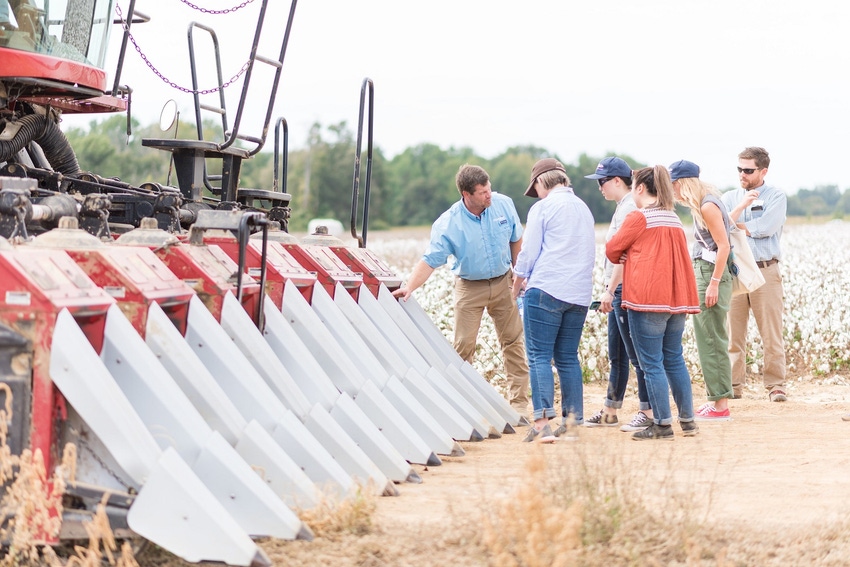
Many of today’s brands, retailers, and textile manufacturers across the world source U.S. cotton because they recognize the comprehensive care taken by those who produce it. From excellent growing and ginning practices, and a wide range of available quality parameters, to sanctity of contract leading to reliable delivery, all factors combine to make U.S. cotton attractive on the world market.
As companies continue to make many of their product ingredient sourcing decisions based, in part, on sustainability, one program born out of an Australian and U.S. cotton industry partnership is gaining momentum and securing market access for all U.S. cotton producers – the Cotton LEADS program.
“This program was started to expand the recognition and use of sustainably-produced cotton on the world market,” explains Mark Messura, senior vice president of Global Supply Chain Marketing, Cotton Incorporated. “Education continues to be a very important aspect in our overall efforts to broaden the understanding of how our producers farm on a path of continual improvement that strengthens their farm’s sustainability each day. Retailers and clothing brands need to know this and support the use of U.S. cotton.”
As U.S. cotton producers continue to adopt and implement the latest farming technologies on their operations, it is those same technologies that are allowing them to increase their on-farm efficiencies and the industry’s overall sustainability moving into the future.
One new harvesting technology is allowing the creation of a transparent loop of information for those global companies who want to know where the cotton they purchased originated. “Radio Frequency Identification (RFID) scanning technology is strengthening the information connectivity for cotton throughout the supply chain,” says Dr. Ed Barnes, senior director, Agricultural and Environmental Research, Cotton Incorporated. “This is the next logical step in technology our growers are embracing that will improve their operations and because of the information transparency, make their cotton more attractive on the world market.”
From the time a round module of cotton is dropped from one of the new John Deere harvesters, RFID tags embedded in the module’s plastic wrap can be used to manage that module through its journey to the gin, and down the module feeder. Information is tied to each bale pressed from that module, the USDA classing sample taken from each bale, and the bale’s HVI data that is finally delivered electronically back to the gin and grower. “This is just one example of how U.S. cotton producers are leading the charge toward a greater level of sustainability,” adds Messura. “
Through the Cotton LEADS program, the National Cotton Council and Cotton Incorporated are reaching out to global brands, educating them about U.S. farmers’ practices and the research that supports them. “Each year, we bring brand and retailer representatives on farm tours so they can learn about what farmers are doing,” says Messura, who admits it is gratifying to see positive opinions develop as each tour progresses. “It all starts on the farm and giving someone who has never even been close to a farm the opportunity to literally see cotton growing makes a huge impact.”
MARKETING, SPECIAL PROJECTS
One representative from a domestic fabric manufacturer reached out to Cotton Incorporated after attending a farm tour. “They have an American-made brand and are able to source fabric and yarns right here in the U.S., and they wanted our assistance,” explains Messura. “We helped them produce a video they now house on their web site and use at trade shows that tells the story of three cotton farmers and their ongoing commitment to sustainability.”
Cotton Incorporated recently received a request from a retail corporation to help them develop some very specific programs that will establish metrics illustrating reductions in emissions and greenhouse gases. “They use a great deal of cotton in products they source and manufacture, and they’re asking each department within their company to establish and work toward their own departmental goals that will contribute to the corporation’s overall goal,” says Messura. “It’s a very all-encompassing and impressive program, but it’s just one program that started with that retailer learning about cotton farming from a farmer on our farm tours.”
Messura admits it can be challenging when he encounters those who do not realize the rules and regulations placed on U.S. cotton producers. “We worked to catalog each local, state, and/or federal rule, or regulation and then created an infographic educational tool that explains each step in the cotton production process and what regulations a grower must abide by at each of those steps,” explains Messura. “When retailers and brands see this information, it increases the confidence they have in U.S. cotton as a responsibly-produced crop.”
When asked where he hopes the Cotton LEADS program will be in ten years, his answer was surprising but filled with reason. “I hope we don’t have to be as proactive as we are currently with the brands and retailers to convince them of U.S. cotton’s sustainability. I want them to be so knowledgeable and confident in what U.S. cotton is doing to stay on that path of continual improvement that they can concentrate their efforts on other more pressing issues like packaging, transportation, or plastics,” concludes Messura.
Cotton Incorporated recently announced JCPenney as a Cotton LEADS partner. There are now 521 brands, retailers, and manufacturers across 31 countries partnering in the Cotton LEADS program.
About the Author(s)
You May Also Like




